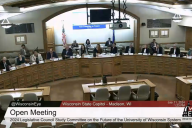You have /5 articles left.
Sign up for a free account or log in.
Adjuncting, as we know, is a constant struggle for anyone who does it full time. For women especially, wage theft, labor exploitation, institutional sexism and parenting issues intersect to affect their working conditions—and, by extension, their students’ learning conditions.
Consider this, from Clare Dale: “I’ve been told that, as a woman, it is often assumed I am bringing in a second income. This is archaic and wrong.”
Or this, from Susan Gill: “Could the fact that imposter syndrome disproportionately affects female academics mean they are more likely to accept precarious conditions?”
A former adjunct remembers something similar to Clare’s experience: her department assumed that, as a wife and parent, she wouldn’t want full-time work. (We’d love to hear from any men who’ve experienced something similar, if there are any.) Two other adjunct mothers are also the breadwinners, which is nearly impossible on their salaries without outside assistance—especially during the summer, when they might not be paid.
Clearly, when we speak of contingent labor in higher education, we are also speaking about gender. But summer is a particularly stressful time for adjuncts, particularly because the semester ends and they don’t know whether they’ll be hired next semester.
At PrecariCorps—the nonprofit I cofounded with Brianne Bolin and Kat Jacobsen—we’re supporting adjuncts financially and professionally. The three of us know from personal experience how tough it is financially to be an adjunct. In talking with others and considering our own experiences, we decided that the best course of action was getting money for adjuncts’ personal and professional needs.
Since January, we’ve received over 30 donations and made 6 financial awards (with several more coming soon) to help adjuncts with rent, car insurance, child care, and other bills. We’ve been collaborating with Women In Higher Education, New Faculty Majority, and other activist organizations to raise awareness and funds to help adjuncts in need. We’ll keep working with these and other organizations, while encouraging other activist groups to do the same. Fixing higher education and helping those grossly underserved by it will take collaboration, multi-front organizing, and regular signal-boosting.
Among other things, PrecariCorps runs a series of True Stories about different aspects of adjuncts’ lives, particularly where gender and contingency intersect. We’ve run four True Stories so far: all by women, and all speaking to common issues in higher ed. These True Stories echo other conversations on social media and in adjuncts’ offices about the systemic nature of the precariat’s problems.
For most adjuncts, supporting themselves is nearly impossible on their salaries without outside assistance—especially during the summer, when they might not be paid.
-
As of mid-May, one adjunct is still “not sure yet if I have a summer class, and not sure how long a temporary office job at school will go. I’m trying to look for other work but it’s nearly finals week right now, so time has been limited. In a nutshell, summer is extremely uncertain.”
-
One adjunct will be working part time in his family’s home repair and maintenance business—perhaps “cleaning gutters for full-time professors and administrators,” he says. He, like many other adjuncts, worries about enrollment all year, but especially in the summer: “My classes fill up because students like me. Full timers take my classes because theirs aren't full. I lose. Students lose.”
-
For Linda J. Lee, “Summer is very rough. There are four months between the last spring & first fall pay dates. Those fortunate enough to have summer courses legitimately fear course cancellation due to under-enrollment. Or, they get reduced pay on a per-student basis. All the prep and marginally less grading, but for significantly less pay.”
-
Fellow activist Lee Kottner: “When the recession hit in 2008, that salary became a liability for [my] company and I was ‘downsized,’ and decided to return to teaching and freelancing. Because of the economy, there wasn’t much freelance work either, so most of my income came from teaching at the satellite campus of a small Catholic liberal arts college in the South Bronx. The pay was laughable, worse than it had been ten years before: $1100 for a six-credit class, and I was confined to teaching 8 credits at most so the school wouldn’t have to provide benefits.”
These tales of #AdjunctTruth are just a sample of the kinds of economic and professional struggles adjuncts face. From now until September, we’re running #AdjunctSummer tweets and stories about adjuncts’ summer plans, experiences, and strategies for making ends meet.
Bills, child care, and other financial needs do not stop when adjuncts aren’t teaching. Even during the school year they rarely receive institutional funding for supplies, research, conference travel, and other important professional expenses. Some will go on unemployment (see here).
We’re always eager to run as many of these PrecariTales as we can. If you’re interested in writing one for us, contact me: joe@precaricorps.org. You choose the topic or experience, and your anonymity is guaranteed.
Tell your story, encourage other adjuncts to do the same, and reach as many professors, students, and parents as possible. As PrecariCorps stresses often, the more adjuncts speak out about their experiences and struggles, the more they can take control of the narrative of contingency.
Joseph Fruscione is a former adjunct professor who now works as a freelance editor and writer in the Washington, D.C., area. He’s also co-founder and Communications Director of PrecariCorps. Find him on Twitter: @ProfessorEx74 and @PrecariCorps.








